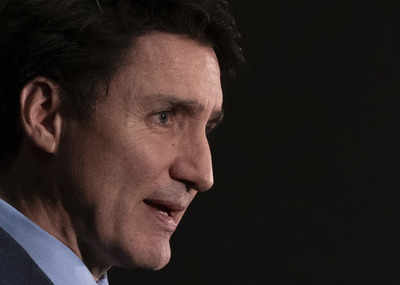Canadian Prime Minister Justin Trudeau is facing mounting pressure to resign amidst internal rebellion, economic challenges, and criticism over his strained handling of foreign relations — particularly with India. Reports suggest Trudeau, 53, could announce his resignation as early as this week, ahead of a critical Liberal Party caucus meeting on Wednesday.
Party revolt: A leadership on the brink
Trudeau’s troubles within his Liberal Party have intensified over the past year. High-profile MPs, including Sean Casey and Ken McDonald, have publicly criticized his leadership, with more than 20 MPs reportedly signing a pledge demanding his resignation. The departure of Deputy Prime Minister Chrystia Freeland in December further weakened his government, with Freeland citing “costly political gimmicks” in her scathing resignation letter.
Adding to Trudeau’s woes, the Liberals suffered defeats in two recent by-elections, and his ally, New Democratic Party (NDP) leader Jagmeet Singh, has threatened to introduce a motion to topple the government when Parliament resumes on January 27.
India angle: Controversy over Khalistani allegations
Trudeau’s diplomatic row with India has become a focal point of criticism. In September 2023, he accused India of involvement in the killing of Hardeep Singh Nijjar, a designated terrorist and Khalistani separatist leader, outside a Sikh temple in Canada. India dismissed the allegations as “absurd,” leading to a tit-for-tat expulsion of diplomats and further straining ties between the two nations.
Critics argue that Trudeau’s allegations against India were a calculated move to appeal to a segment of the pro-Khalistani Sikh voter base in Canada. However, the lack of conclusive evidence has led to international skepticism and domestic backlash, with many Canadians perceiving the accusations as a distraction from pressing national issues, including economic stagnation and a housing crisis.
Leadership vacuum and conservative surge
If Trudeau resigns, the Liberal Party faces the daunting task of selecting a new leader before the federal elections later this year. Potential successors like Dominic LeBlanc, Mélanie Joly, and Mark Carney lack the mass appeal to counter the growing popularity of Conservative leader Pierre Poilievre, whose promises to repeal carbon taxes and address Canada’s housing crisis have resonated with voters.
With Poilievre’s Conservatives holding a double-digit lead in opinion polls, Trudeau’s resignation could plunge the Liberals into further disarray.
Fallout in India-Canada relations
For India, Trudeau’s exit could open the door to resetting bilateral relations, which have been clouded by his government’s alleged pandering to Khalistani sympathizers. As the diplomatic freeze continues, India may view this political shift as an opportunity to engage more constructively with a future Canadian government.




